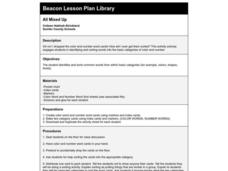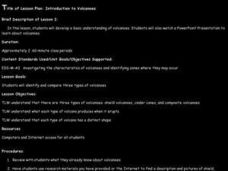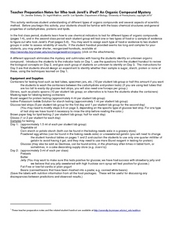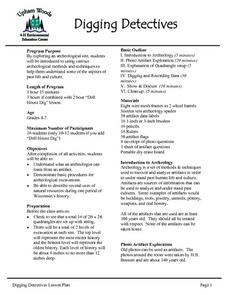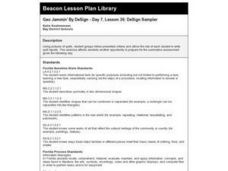Curated OER
Living and Non-Living
Students discover the basic needs of life. In this science lesson plan, students explore how all living things need air, water, food and shelter
Curated OER
Exploring Limu Diversity
Young scholars explore limu diversity. In this ocean ecosystem activity, students classify limu according to its physical properties. Young scholars work in small groups to generate scientific observations and sort limu by characteristics.
Curated OER
All Mixed Up
Students identify and sort words into the basic categories of color and number. After a lecture/demo, students utilize a worksheet imbedded in this plan to gain practice sorting number words.
Curated OER
Altruism: Meeting Society's Needs
Students study society's needs and altruism within communities. In this altruism lesson, students identify and categorize the basic needs that human beings have and define altruism. Students complete research on altruistic...
Curated OER
Introduction to Volcanoes
Young scholars develop a basic understanding of volcanoes. They watch a PowerPoint Presentation which introduces three types of volcanoes: shield volcanoes, cinder cones, and composite volcanoes.
Curated OER
Biotechnology Projects and Writing Assignments
Students research a subject about biotechnology and do a project or a writing assignment on it. They can pick from a possible eighteen different projects and five different writing projects.
Curated OER
The Business of Design
Students visit the Design for the Other 90% exhibition. In this design lesson, student learn how to design for the population of the world that is poor or impoverished. In addition, students read New York Times articles and watch videos...
Curated OER
Viruses, Bacteria, Protists, and Fungi
In this viruses, bacteria, protists, and fungi worksheet, students will review the basic characteristics of each of these groups. Students will complete 7 fill in the blank questions about viruses, 6 true or false questions about...
Curated OER
Who Took Jerell's iPod?
High schoolers investigate various substances to determine the perpetrator of a crime. In this biology lesson, students test for the presence of organic compounds in various samples. They identify an unknown substance based on its...
Curated OER
Where Do Your Veggies Grow?
First graders investigate the origins of vegetables. In this Science activity, 1st graders identify where fruits and vegetables come from. Students describe how people utilize plants.
Curated OER
Eating for Your Future
Students brainstorm ways to live healthy. In this health science lesson, students recipes that are healthy and appealing. They compile all recipes and develop a class cookbook.
Curated OER
Microwave Introduction
Sixth graders learn the principles of microwave cooking and how to use and care for it properly while preparing foods.
Curated OER
The Needs of Living Things
Learners watch video clips of animals and plants in their natural environment, to gather evidence that all living things have basic survival needs. Students draw pictures of real or imaginary pets eating, drinking, breathing, and taking...
Curated OER
Visual Representation of Reduced Fat
Students demonstrate their understanding of the Five-Number Summary and Box-Plots by analyzing different nutrition labels from regular and reduced fat items using graphing calculators.
Curated OER
Colored Clouds
Fourth graders, in groups, examine how particles in warm water move faster than particles in cold water.
Curated OER
Digging Detectives
Students demonstrate basic procedures for archeological excavations. They explore an archeological site, students using various archeological methods and techniques to determine some of the aspects of past life and culture.
Curated OER
Prairie Field Trip
Students study prairie conservation and the plant and animal life within. For this prairie life lesson students divide into groups and complete a lab activity.
Curated OER
What is Temperature and How Is It Measured?
Young scholars complete activities to measure temperature. In this temperature lesson, students read Geoffrey Groundhog Predicts the Weather and make a KWL chart about predicting weather. Young scholars discuss folklore about temperature...
Curated OER
Chemistry: Plastic Milk
Students observe a basic chemical reaction as vinegar is mixed with skim milk and microwaved. First, they listen to the teacher read, "Little Miss Muffet," and discover the meaning of curds and whey. While the experiment have an...
Curated OER
Geo Jammin' By DeSign - Day 7, Lesson 36: DeSign Sampler
Second graders, in groups, write quilt reports.
University of Georgia
Flavor of Organic Chemistry
Introduce organic chemistry through an analysis of flavor. A three-part unit begins with an overview of the components of flavor. Next, scholars prepare esters through esterification. Finally, they examine how all senses have an impact...
LABScI
Acids and Bases: Cabbage Juice pH Indicator
Explore the range of pH using an assortment of household liquids. Scholars create their own pH indicators from cabbage and determine the pH of several liquids. To further their exploration, individuals use the same liquids to create...
LABScI
Population Dynamics: The Predator-Prey Lab
Wolves eat better when the bunny population increases, but how long does that last? A series of 12 biology lessons uses the sixth installment to explore the predator-prey relationship between bunny and wolf populations. Young scientists...
Curated OER
But I Need This
Third graders place everything in their desk or back pack onto their desk top. They explain why each item is needed. They receive a set of pictures and write a list of things each person or animal needs to survive. They compare people,...




